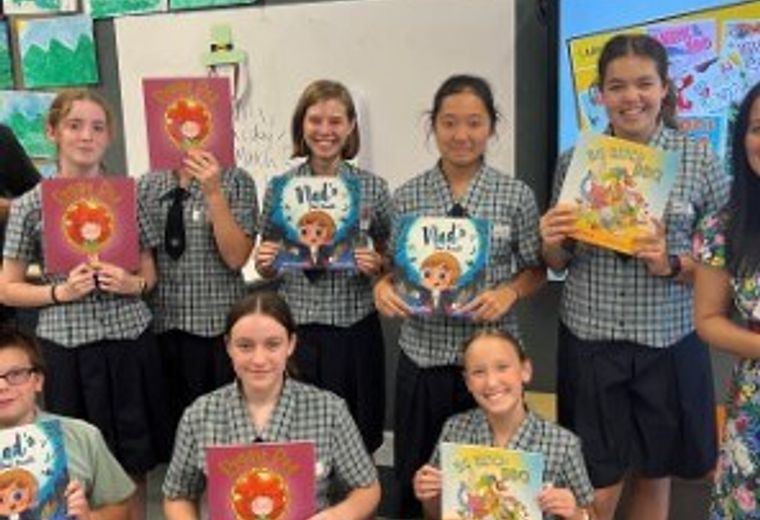Literacy Matters a Lot!

We’re proud to say that, with so many priorities in education today, in the Secondary Campus of Coomera Anglican College, a dedicated Literacy focus remains at the forefront.
We are very fortunate to enjoy a collective approach to encouraging students’ literacy growth, with the entire secondary staff taking ownership and working together to foster ever-increasing literacy outcomes.
1. For staff and all students (by staff)
Late in 2020, a Literacy Group was formed, comprised of staff from all sectors and key learning areas of the secondary curriculum, and together they’ve led the charge on specific Literacy initiatives. One of these is the weekly ‘Literacy Spotlight’ presentation at Monday morning secondary staff briefing – from hot tips on using apostrophes correctly, to ways to encourage students’ reading (strategies for pre, during and post-reading), and approaches to become more active listeners. The priority – keeping it simple, short and sharp, making it easy for all staff to digest and try with their students.
The outcome? Greater staff confidence in approaching aspects of literacy with students across subject areas. We now have a very impressive (and growing!) bank of mini-presentation PowerPoint resources for staff to use as a handy reference point when focusing on a particular aspect of Literacy – Reading, Writing, and Speaking/Listening - with students.
2. For all students Our library (now The Hub), curated and expertly managed by librarian, Ms Marija Sijakowska, has been key to building students’ confidence in becoming more literate in a wide range of ways – with incredible enhancements to the physical library space, the revamping and reimagining of our collection of reading material, and encouraging students to engage with reading through opportunities such as Readers’ Cup and other competitions. The outcome? Increased book borrowing rates. Students actively involved in a range of activities within and beyond the library spaces.
3. For students in English classrooms
Within the English Faculty in particular, approaches to growth in student literacy include:
a. Literature Circles reading programs in Years 7 and 8
b. Authors-in-residence – in the past year, we’ve been thrilled to welcome acclaimed authors such as Nick Earls and Brian Falkner to the College to share their writing expertise with students
c. Annual Storyfest excursion for literature lovers
d. English tutorials for both Junior and Senior English students
e. A return to using a handy hard copy student reference book for developing grammar, spelling, reading and writing in Year 7 to Year 9 (Successful English – Books 1, 2 and 3)
f. A spiralling approach to writing progressions from Year 7 to Year 12 – in key writing areas of analytical, persuasive, narrative, and public audience text types
g. Classroom posters – e.g. sentence starters, colour-coding in paragraph writing, analytical essay writing, and a connectives placemat h. Literature as a subject is now into its fourth year of life at the College i. 2021 Year 12 English results for the College’s students were among the best in the state – 85% of our cohort received either an A or B (compared with 62% statewide) and one of our students, Caitlin Brims received 100/100, the highest possible result.
4. For parents
As we all know, the best outcomes occur with a team approach, and another key element in the literacy approach in Secondary at Coomera Anglican College is in partnering with our parents by sharing The ‘R’ Word – a parent guide to support teen reading resource. It has been created specifically for Australian parents of secondary school-aged children and offers hope in the form of 18 practical tips to begin using today.
The creation of this resource was sparked by the age-old question raised by parents genuinely seeking to support their child’s reading journey (through the teenage years and into adulthood):
‘How can I get my teen reading?’
Parents of incoming Year 7 students have received a copy of this resource and is available to all parents, either in electronic or hard copy format – so it can be kept handy, on the coffee table, the kitchen bench or a bedside table, as a quick reference point for parents looking for inspiration in supporting their teen’s reading.
Here’s a sample of the tips included in the guide:
Tip #2 – The screen magnet – this tip provides practical suggestions for combating the lure of the biggest threats to reading – the phone screen, the computer screen, and the television screen
Tip #9 – Allow for restarts – this tip is all about remembering that it’s not that reading can’t be enjoyed; it’s just that some books aren’t the right fit for some individuals. It’s important to stay with the quest to find the ‘right’ book, rather than simply giving up.
Tip #14 – Should vs Could – explores (and dispels) the myth that there is such a thing as a list of must-read books; focusing on the idea that teens should feel free to read whatever book they choose to read.
In short, the importance of literacy development of each individual student across the areas of reading, writing, listening and speaking isn’t just something we ‘talk’ about here at the College. We are truly fortunate to have a community-wide valuing of literacy and a commitment to working in a myriad of ways to see students’ literacy blossom throughout their learning journey.
